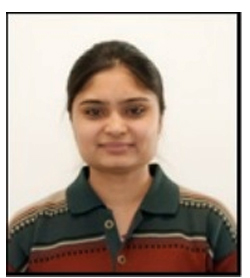 Dr. Ankita Katre from Centre for Modeling and Simulation, S P Pune University, Pune is a recipient of the INSPIRE Faculty Award instituted by the Department of Science & Technology, Govt. of India, working on understanding the thermal transport of nanomaterials for thermoelectrics and nanoelectronics which can help conserve waste heat.
Dr. Ankita Katre from Centre for Modeling and Simulation, S P Pune University, Pune is a recipient of the INSPIRE Faculty Award instituted by the Department of Science & Technology, Govt. of India, working on understanding the thermal transport of nanomaterials for thermoelectrics and nanoelectronics which can help conserve waste heat.
Dr. Katre’s research interest is mainly two-fold-- development of methods and models for calculating transport properties in materials and application of these methods to technologically relevant materials and consequently understanding the underlying phenomena, which affect transport properties. She has been extensively involved in the development of computational codes for calculating thermal conductivities in complex materials. Recently in one of her works from Physical Review Letters, she implemented an ab-initio Green's function method a first of its kind implemented in the ‘almaBTE’ code used to thoroughly understand the effect of point defects on thermal conductivity of materials. The novelty and uniqueness of this interdisciplinary research is that for the first time, such an atomistic technique for defects has been implemented.
A big motivation behind Dr. Katre’s research work is the idea of ‘energy conservation.’ The heating of electronic gadgets, which causes a drop in their efficiency and lifetime, causes enormous problems in modern-day technologies. Furthermore, a large amount of heat is also released from automobiles, industrial plants, commercial and medical equipment, and so on. Hence, to reutilize this waste heat using thermoelectric technology and to design efficient nanoelectronic components, it is important to understand the thermal transport in their building blocks with a fundamental approach using an atomistic description.
During the tenure of DST-INSPIRE Faculty, her research group is focused on centralized theme of understanding transport properties in materials with several different techniques and methods. Research by her group on noble prize-winning material – Gallium nitride (GaN), has been well-received recently. The study published in the journal Physical Review Materials discusses the effect of different defects – single atomic defect (introducing single impurity element like Magnesium in GaN), coupled defect (introducing two impurity elements like Magnesium, Oxygen in GaN) and cluster defects (introducing three and more impurities) – on the thermal conductivity of GaN. In the cluster defects, her research group found that Hydrogen – the lightest atom in the periodic table - has its surprising role in GaN’s properties.
The future vision of Dr. Katre’s research group during the course of this Faculty award is to understand electronic transport properties in materials and also focus on incorporating ML and AI too in their research work. She has also co-authored an invited perspective in the Journal of Applied Materials on ab initio techniques in thermal transport, which aims at opening new ideas and avenues in this field and scientific community.
Publication links:
[1] Katre et al., Physical Review Letters, 119, 075902 (2017).
https://doi.org/10.1103/PhysRevLett.119.075902
[2] Carrete et al., Comp. Phys. Comp., 220, 351, (2017).
[3] A Katre et al., Physical Review Materials - Rapid Communications, 2, 050602 (2018).
[4] JK Pious, A Katre et al., Chemistry of Materials 31 (6), 1941-1945 (2019)
[5] MM Rojo, SM Islam, A Sood, B Vareskic, A Katre, et al., Journal of Applied Physics, 126, 185105 (2019)
https://doi.org/10.1063/1.5097172
[6] LL Lindsay, A Katre et al., Invited Perspective in Journal of Applied Materials, 126 (5), 050902 (2019)
https://doi.org/10.1063/1.5108651
For more details contact Dr. Ankita Katre (ankitamkatre[at]gmail[dot]com)






























